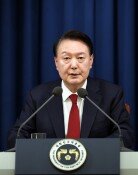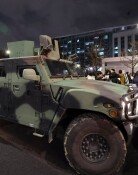Citizens save time for the National Assembly to vote on lifting martial law
Citizens save time for the National Assembly to vote on lifting martial law
Posted December. 05, 2024 07:38,
Updated December. 05, 2024 07:38
On Wednesday morning, the National Assembly passed a resolution demanding the lifting of martial law after over two hours and 30 minutes of intense deliberations. This crucial time was bought by thousands of citizens who rushed to the National Assembly ahead of armed martial law troops and police. When the troops attempted to block the National Assembly’s actions by entering the main building, the citizens physically stood their ground, chanting, “Go back” and “Do not participate in illegal martial law.” Their efforts gave lawmakers the time needed to vote. Once martial law was lifted and the troops withdrew, citizens made way for them peacefully, expressing, “Let’s help.” Their determination ensured that the crisis was resolved without significant casualties, demonstrating the power of collective resistance against unjust martial law.
Even as armed soldiers entered the National Assembly, the government failed to issue emergency disaster alerts. Instead, citizens spread updates via phone calls and text messages after watching the president's emergency speech broadcast. Those at the scene recorded the martial law troops’ movements on their phones and shared the footage in real time, creating an environment where the military found it difficult to use force under the scrutiny of the nation and the global community. Remarkably, there were even parents sending messages to their children in the military, urging them to “stop attacking citizens.”
Korean democracy has historically relied on the resolve of its citizens in times of crisis, as seen during the April 19 Revolution, the May 18 Democratization Movement, and the peaceful candlelight vigils of 2016 that led to the impeachment of the Park Geun-hye administration. When martial law threatened the country’s democratic fabric and global reputation, the citizens’ unwavering resistance safeguarded Korea’s prestige and ensured its democratic values prevailed.







